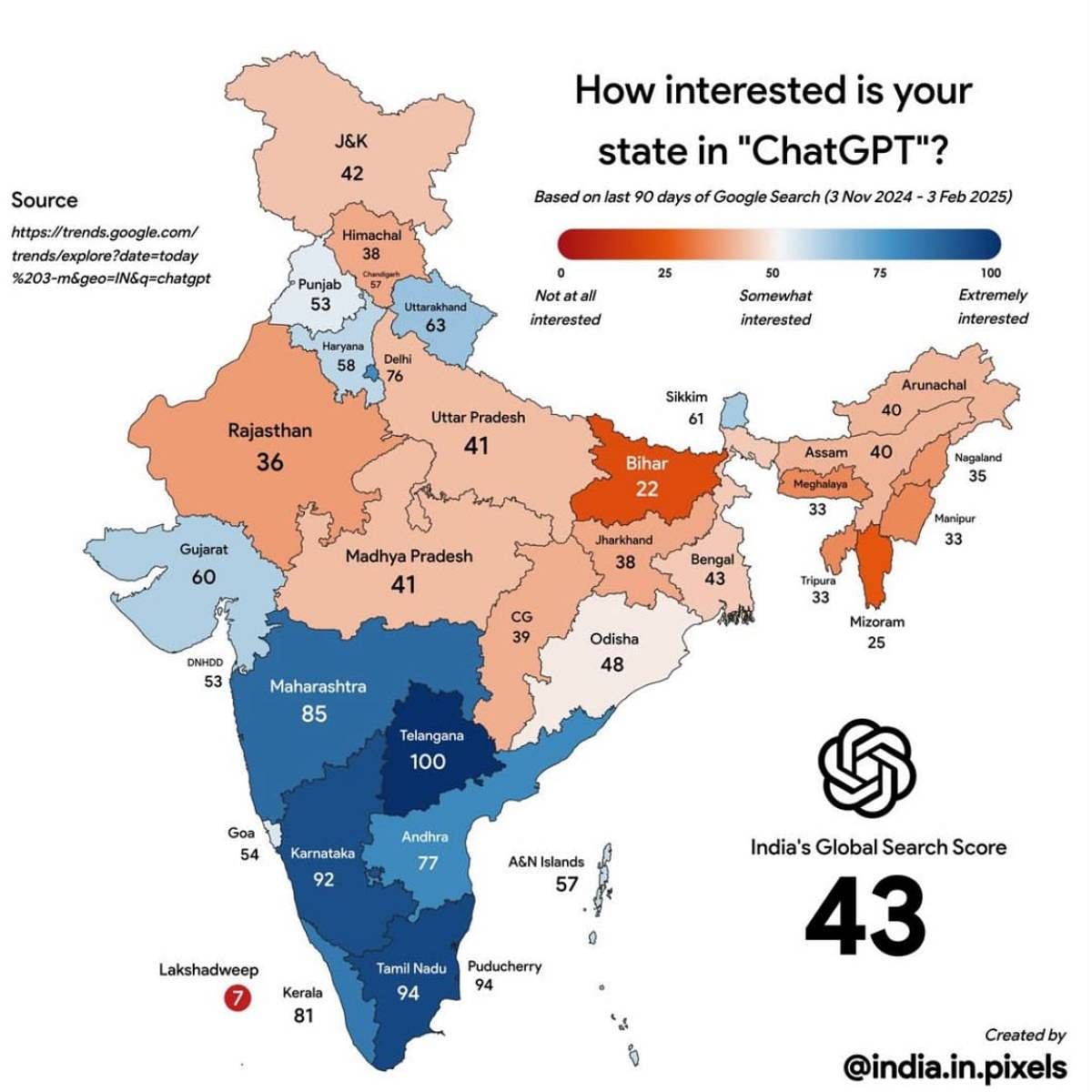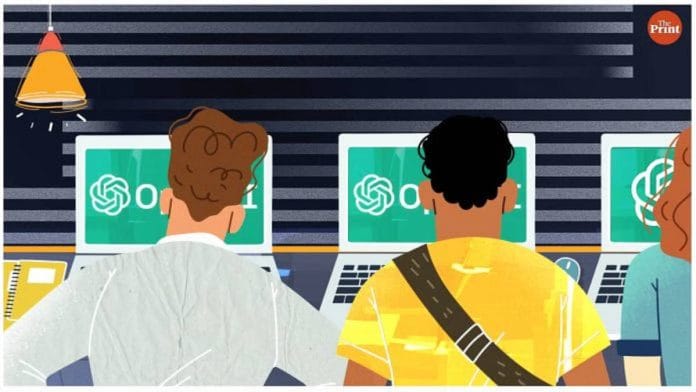New Delhi: Telangana leads Indian states in searches about ChatGPT, followed closely by Tamil Nadu and Karnataka. At the other end stands Bihar, with minimal curiosity about the AI tool, according to the latest Google Trends data accessed by India in Pixels, a data storytelling platform that breaks down and simplifies data for public consumption.
Ashris Choudhury, software engineer and data visualiser, and the mastermind behind India in Pixels, told ThePrint that the states’ ranking is based on Google searches for ChatGPT over the past 90 days from 3 November, 2024, to 3 February, 2025.
In the top five, Telangana scores a perfect 100, Tamil Nadu 94, Karnataka 92, Maharashtra 85 and Kerala 81.
Addressing the misconception that the numbers represent percentages, Choudhury noted that the ranking system is relative and not absolute—meaning Telangana, with a score of 100, searched for ChatGPT the most compared to other states.
“It’s a relative scale rather than an absolute scale,” he said.
The top five states have one thing in common—a strong IT sector and educational institutions that have been at the forefront of AI adoption.
Bihar stands out with the lowest score of 22. Northeastern states, including Mizoram (25), Tripura (33), Manipur (33), and Nagaland (35), also seem the least interested in ChatGPT, reflecting lesser exposure to AI tools.
Delhi, with a thriving startup culture, scores 76, Gujarat 60 and Punjab 53. Uttar Pradesh and Madhya Pradesh both scored 41, and Rajasthan scored 36, showing lower-than-expected engagement. Lakshadweep, a union territory, records the lowest score of 7, highlighting minimal engagement with AI.

As AI becomes an integral part of daily life, Indians are increasingly exploring tools like ChatGPT. India’s global search score for ChatGPT stands at 43, showcasing moderate interest at the national level.
Also Read: Tech selloff deepens as Chinese start-up DeepSeek triggers AI rethink
Possible reasons behind disparity
The data acts as a proxy for AI interest across different Indian regions, and highlights a “disproportionate amount of interest in AI in the southern parts of India”, said Choudhury, attributing this to the concentration of tech jobs in states like Karnataka, Tamil Nadu and Telangana, where engineering and software careers dominate.
One major reason for the disparity among north and south India is education and employment trends, explained Choudhury, adding that this aligns with AI adoption, as those with technical backgrounds are more likely to engage with tools like ChatGPT.
“A lot of people in the north of India take up humanities, while people in the south take up engineering,” he said.
States with higher proficiency in the English language may show more engagement with AI-powered tools. Additionally, economic factors influence adoption.
“It also correlates with per capita income and how much people earn,” Choudhury said, suggesting that higher-income states, where more people own laptops and have internet access, are more likely to explore AI.
He asserted that language proficiency plays a big role in usage of ChatGPT, which he said supports multiple languages but “primarily works best in English”.
He underlined AI’s “strong English bias” as a crucial challenge for its future in India and said that there is a need for India to develop AI tools in regional languages to prevent large sections of the population from being left behind. “I am concerned about this English elitism, which might cause problems in a multilingual society like India,” he said.
Srinivas Kodali, an independent researcher, told ThePrint that the difference in AI adoption numbers between south and north India is due to the economic sectors of the states, and that IT hubs like Bengaluru and Hyderabad, which have a significant influence on state policies, are in the south.
“It has always been the industrial policy of these states to adopt new technologies. AI is just one of the technologies they are adopting,” he noted.
He added that access to the internet will determine who can access new technologies.
“While the idea is for India to build its own AI models, we may just remain consumers of it if we don’t invest strategically,” he said, adding that people are using ChatGPT to create content, make it write their software programmes, invest in the stock market, reply to emails and automate some part of their work.
‘As important as internet’
India has become ChatGPT developer OpenAI’s second-largest market, with its user base in the nation tripling in the past year, CEO Sam Altman said Wednesday during his visit to India.
“India is an incredibly important market for AI in general and OpenAI in particular. It is our second-biggest market, we tripled our users here in the last year,” he stated at an OpenAI-hosted discussion with IT minister Ashwini Vaishnaw and key players in the country’s startup and venture capital ecosystem.
Choudhury, who works closely with AI and examines the trends, said the surge in use of AI and platforms like ChatGPT can be seen as a transformative force.
“I think this is going to be as important as the internet, if not like electricity,” he predicted.
However, he warned that jobs which are at the risk of “being automated” could pose challenges for India, since much of India’s labour force is dependent on such jobs.
Despite concerns over job losses, he said, if the West focuses on innovation rather than just automation, “we can revolutionise so many aspects of our system—from banking to healthcare”.
Optimistic about AI’s long-term impact, Choudhury noted that the combination of humans and AI will give better results in any given field.
He also cautioned against blind reliance on AI tools, as they can generate incorrect information. Moreover, with the rise of alternative AI models like Claude and DeepSeek, Choudhury said that people can explore options beyond ChatGPT.
“If people educate themselves, they’ll see there’s something better suited for them,” he added.
Akash Karmakar, Partner, Technology-Transactions at Panag & Babu law firm, told ThePrint that if ChatGPT is trained in Hindi, and other regional languages, there will likely be wider adoption of the AI model.
He noted that India will likely see AI being used in a range of sectors, which will likely augment the workforce. For instance, he said, artificial intelligence today is able to review x-rays for aberrations, and provide fairly accurate analysis based on blood reports.
“If there is a shortage of doctors in paramedic staff, AI will help fill this shortage,” he said, adding that the majority of the population will have a choice—either to upskill into a specialised role or use AI to facilitate greater efficiency.
According to him, the inadequacy of India’s education system to prepare people for the workforce has been its biggest pitfall.
“The government has been trying to solve this with various skill development initiatives. AI, if deployed in a culturally sensitive context, could be used to upskill employees and improve efficiency in semi-technical and technical roles,” he suggested.
(Edited by Nida Fatima Siddiqui)
Also Read: ChatGPT is boosting human creativity, not killing it. Here is how







It’s sad that Assam and Tripura always get classified with other north-eastern states and therefore are depicted in poor light. The Assamese people as well as the Bengalis (mostly immigrants from Bangladesh) are very well educated and therefore, very well aware of the goings on in the outside world.
And yes, everyone is curious about DeepSeek and ChatGPT.
Just because we get clubbed with the other tribal-majority states of the north-east is no reason to discount us or underestimate us.